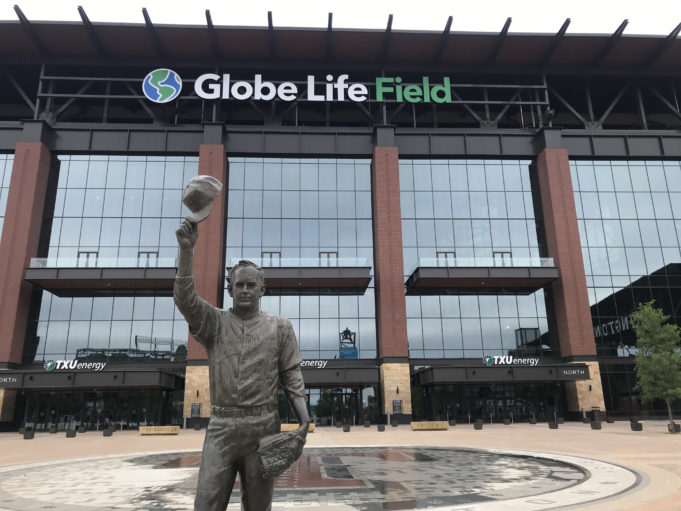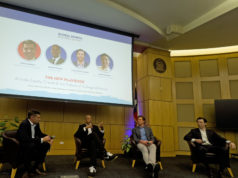The future of the Texas Rangers sits empty in Arlington. The team had hopes that Globe Life Field and its retractable roof would create or retain generations of fans who would never have to complain “I just don’t want to go sit in that heat for three hours.” Thanks to the coronavirus, they haven’t gotten to use it for that purpose.
The Rangers’ situation reflects that of the sport of baseball itself. Its keepers have empty boardrooms, but, luckily, thanks to digital technology, executives from Major League Baseball and the players’ union can still conduct meetings as they try to figure out how to return to their stadiums. The decisions they make could affect the future of the brand well beyond this season.
Before the virus intruded, the game’s brand had certain strengths. It occupies a storied place in U.S history and is one of the country’s big four sports. It offers the romance of chilling out a a ballgame. Because it schedules more games than any other sport and puts most of them during summer months that face less competition from other leagues, it has become a valuable property to broadcasters.
On the downside, its audience has been aging and many say the pace of the game doesn’t lend itself to attracting younger demographics. Major League Baseball was slow to empower its teams on social media compared to other leagues, which put it even further behind among young audiences.
So they have to figure out a way to start their season. How many games will they play? Where? Can they safely do it in front of fans?
One issue that could hold things up is an issue that has long been part of baseball’s brand: labor disputes. Both sides know revenues will be reduced. The players recognize this and have agreed they should earn less if they play fewer games in front of fewer fans with sponsorship revenue no doubt reduced as well. How that payroll reduction is achieved has been a sticking point.
Unlike many other sports, baseball has no salary cap tied to league income. MLB has a luxury tax and revenue sharing, but salary levels don’t get automatically pegged to how much money is coming through the door. MLB proposed such an arrangement for this year only, but the players want guaranteed, if reduced, salaries. Part of the players’ reasoning is long-term. If the owners get a salary cap now, they figure, it’ll be easier to push for one in the labor negotiations set to occur when the current collective bargaining agreement expires following the 2021 season.
That’s a long-term play by the players. The owners have some long-term leverage in that it might hurt them less to lose an entire season than it would a player with a finite window of peak productivity. Both sides have to remember that they need to factor the health of the game into their long-term calculations for maximizing revenue.
In 1994, a players’ strike wiped out the end of the regular season and the postseason. Fan backlash proved severe. Attendance didn’t regain 1994 levels for another 10 years. If the two sides don’t agree this time, it could be even worse. They likely face a COVID-fueled recession and people have a lot more entertainment options than they did in the mid-1990s. Plus, the late-‘90s home run chase of Mark McGwire and Sammy Sosa sparked renewed interest in the game, and such a singular event will be hard to duplicate.
Compounding the problem is the fate of players and clubs below the MLB level. Contraction looms even for those minor league teams that survive their seasons’ cancellations, because Major League teams want to stop funding so many affiliates. Some of those clubs may survive in independent leagues, but they seem unlikely to generate the same level of interest as when they could point to future MLB talent on their rosters. The ballpark experience plays heavily into the appreciation of the game, and many a grassroots fan has come to love the game in charming minor league parks watching the likes of the Clinton LumberKings, Toledo Mud Hens, or Fort Worth Cats.
It doesn’t cast aspersions on the merits of either side’s arguments to note that a “millionaires vs. billionaires” perception is a bad look for baseball. Rightly or wrongly, MLB has been perceived by some as a bully in their minor league negotiations, too.
Other entities besides the PA and the league have long-term interests in keeping the sport popular. The most significant of those is Sinclair Broadcast Group. After their purchase of the Fox Sports regional properties (Fox Sports Southwest locally), they own most of the sports networks that carry the vast majority of regular-season games. They have big-money long-term agreements with individual teams. Because baseball represents such a huge portion of their prime-time inventory, they need the sport to perform up to expectations. That’s especially true with advertising inventory expected to move slowly in a recession and cable carriage fees reduced as more people cut the cord in favor of internet-based TV options.
Sinclair is most teams’ single biggest customer. They employ lots of former players on their broadcast teams. Could they intervene in the negotiations to pressure teams and players to come to an agreement to save the season? If they did, they might, at the same time, help save the future.












